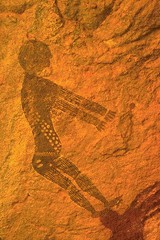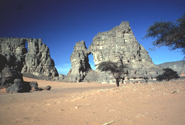|
Algeria Travel - Leisure | Economy - Development | Politics Algeria desert tourism finally recovering
Helge Baardseth was a tour guide for Scandinavian charter adventure tourists visiting the Algerian desert region in the late 1980s and early 1990s. Since the political trouble tore Algeria apart in 1992, there were no tourists to lead to the country, but in February, Mr Baardseth plans to return to the Hoggar Mountains for the first time with a group of ten Norwegian climbers, longing to revive Algerian memories from happier days.
Charter tours to the famous destinations of Tamanrasset, Djanet, Hoggar and Tassili n'Ajjer were impossible to organise after 1992. "It was difficult to take tourists to the region when the newspapers were full of reports of political violence in Algeria, and it was problematic that one had to make a stop-over in Algiers," Mr Baardseth said. While the Algerian warfare between Islamists and the government ended several years ago, Algiers has yet to gain full control of its vast desert south. Al Qaeda affiliated groups are operating along the southern border. In 2003, a group of 32 European tourists were kidnapped in the desert. Still, the situation is tense in many parts of Algeria. Only today, terrorists detonated bombs outside two police stations in Reghaia, outside Algiers. Generally, however, the security situation has improved strongly in Algeria. In the opinion of Mr Baardseth, it is now safe enough to participate in organised tours in the country. "The conflicts that earlier made the area insecure by now seem resolved, at least to such a degree that it is no longer necessary choosing not to go there," he told afrol News. This is also the message that Algerian authorities want to communicate, as the general image of the country abroad is still one of violence and terror. For the last two years, Algiers has reformed its legislation to ease foreign and local investments in the tourism sector. The government qualifies the country's tourism resources its "second oil resource," referring to its main export article, petroleum. The message has reached through in some parts of the world, as in particular French investments in the sector are rapidly increasing. By now, there is even a French discount airliner, Aigle Azur, flying non-stop from several cities in France to Djanet and Tamanrasset the desert and to coastal cities like Algiers, Oran and Annaba. Not everybody agrees to these optimistic security assessments, however. The US State Department still advises its citizens against travelling to Algeria, saying "the security environment in rural and remote areas continues to pose a significant security risk." The British Foreign Office, which updated its Algerian travel advises only last week, reminds Britons that "there is a continuing threat from terrorism in Algeria." By staff writers © afrol News - Create an e-mail alert for Algeria news - Create an e-mail alert for Travel - Leisure news - Create an e-mail alert for Economy - Development news - Create an e-mail alert for Politics news
On the Afrol News front page now
|
front page
| news
| countries
| archive
| currencies
| news alerts login
| about afrol News
| contact
| advertise
| español
©
afrol News.
Reproducing or buying afrol News' articles.
You can contact us at mail@afrol.com









